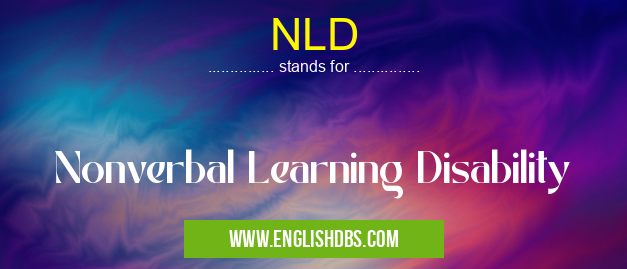What does NLD mean in DISABILITY
Nonverbal Learning Disability (NLD) is a neurological disorder that has been recognized since the late 1980s. This condition affects individuals who are able to learn and understand verbal information, but have difficulty understanding and interpreting non-verbal cues such as body language, facial expressions, gestures, and social conventions. NLD can cause significant social and academic difficulties for those affected by it, making it difficult to function in school and relationships. Fortunately, there are strategies that can help individuals with NLD succeed in their endeavors.

NLD meaning in Disability in Medical
NLD mostly used in an acronym Disability in Category Medical that means Nonverbal Learning Disability
Shorthand: NLD,
Full Form: Nonverbal Learning Disability
For more information of "Nonverbal Learning Disability", see the section below.
» Medical » Disability
Essential Questions and Answers on Nonverbal Learning Disability in "MEDICAL»DISABILITY"
What is Nonverbal Learning Disability?
Nonverbal Learning Disability (NLD) is a neurological disorder that affects the way individuals interpret nonverbal information from their environment. This includes difficulty with tasks such as facial expression recognition, interpreting body language and understanding relationships between objects in space. It can also affect an individual's ability to recognize social cues, interact with others and communicate effectively.
Who is affected by NLD?
Nonverbal Learning Disabilities are most commonly seen in children, typically those between the ages of 5-15 years old. It can affect both genders, though tends to be more common in males than females.
Are there any typical signs of NLD?
Signs of NLD can vary between individuals but some common indicators include poor spatial awareness, difficulty understanding social cues or body language, difficulty recognizing facial expressions or interpreting tone of voice, poor visual-motor coordination, poor handwriting and organization skills.
Is NLD the same as Autism?
No - although both conditions may present similar challenges in navigating the world around them, they have different underlying causes and characteristics. Autism tends to involve difficulties with communication and social interaction while NLD involves difficulties understanding nonverbal forms of communication such as body language and facial expressions.
What strategies can be used to support someone with NLD?
A range of strategies should be used when supporting someone with NLD including providing clear instructions with step-by-step guidance; breaking tasks down into smaller chunks; using visual aids like diagrams or pictures; providing direct verbal feedback; allowing time for processing information; encouraging regular physical activity; ensuring consistency between environments; helping develop problem solving skills; modeling appropriate behavior; creating routines and schedules; providing emotional stability; offering support when needed etc
How is Diagnosis for Nonverbal Learning Disability Made?
To diagnose a Nonverbal Learning Disability an assessment from a specialist health professional such as a psychologist or psychiatrist will be needed. This will involve looking at various factors including medical history, cognitive assessments, behaviour observations etc. Once diagnosed an individualised treatment plan should be created that looks at both strengths and weaknesses in order to provide effective intervention strategies.
Does medication help people with NLD?
Yes - depending on the severity of the symptoms medication can help manage difficulties related to attention deficits associated with NLD such as impulsivity or hyperactivity for example. However it is important that all treatments are tailored specifically to an individual's needs which may involve psychological interventions such as cognitive behavioural therapy (CBT) alongside medication if necessary.
Are there supports available for people living with NLD?
Yes - there are a range of supports available for individuals living with Nonverbal Learning Disabilities including special education programmes designed to meet their specific needs; occupational therapy sessions which focus on sensory issues or motor skill development among other things; speech therapy sessions which help coordinate muscle movements required for speaking properly etc
Is it possible to move beyond having an NLD diagnosis?
Absolutely - There are many resources available today which offer tailored advice and guidance for living successfully with an NLd diagnosis such as peer support networks, access to assistive technology etc It is also important that individuals remember that everyone functions differently so they need not feel limited by their diagnosis but instead use it as motivation to achieve success.
Final Words:
Nonverbal learning disabilities can be difficult for those affected by them due to their difficulty interpreting non-verbal cues like facial expressions and body language accurately; however it is important that the individual receives appropriate support systems early on so they can learn proper coping mechanisms which will enable them to live full productive lives despite their disability. By providing effective management strategies tailored specifically towards those suffering from this neurological disorder through regular assessments, clear expectations, positive reinforcement, breaking down tasks into manageable pieces et al ; these individuals will be better equipped with skills necessary for tackling life’s challenges head on.
